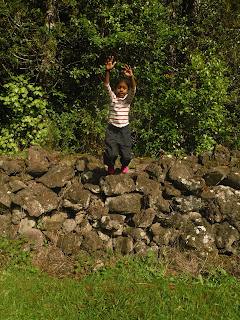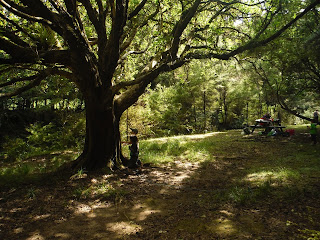It was our first nature programme for 2018 and I was lucky enough to be the teacher rostered on! We had 7 new children starting on this day and all of them seemed quietly excited when they arrived at drop off. I too was feeling excited but also nervous about how the morning was going to play out with so many new children to transition into the programme all at once.
As we entered the bush I felt a sense of peace come over the group. The walk down the path was at a slow pace and the children and adults stopped to notice some of the beautiful happenings that were taking place amongst the leaves and the trees. In particular all the colourful and interesting fungus! Then as we entered the clearing known as the meadow the children ran around playfully, rolling around, jumping off things and playing games with one other.
The morning continued in this fashion, the children flowing in and out of bursts of excited and energetic play and then engaging in quieter and more softer experiences. As I checked in with the children during the morning, asking how they were feeling and if they were enjoying this time in the ngahere, they all responded with positive reflections of how they were having such a wonderful time, saying things like, “I love the Nature Programme.” And “I can’t wait to come back, there is cool things in this bush. I love the sliding in the mud and finding the cada (cicada) shells.”
“Nature
is important to children’s development in every major way—intellectually, emotionally,
socially, spiritually and physically.” (Kellert, 2005).
It was such a beautiful and
energising morning and it left me reflecting once again about how much I value this programme that we have been running for the past 7 years (thanks to the ongoing
support that we have had from our kindergarten whānau, and also the COG’s grants that
we have received over the years to pay for our Nature Programme Coordinator
wages).
“Being in
nature, or even viewing scenes of nature, reduces anger, fear, and stress and
increases pleasant feelings. Exposure to nature not only makes you feel better
emotionally, it contributes to your physical wellbeing, reducing blood
pressure, heart rate, muscle tension, and the production of stress hormones.”
(Larson)
As a teacher, and also a parent of
young children who have been and are a part of Mairtown Kindergarten, I feel
blessed. It is so good for the soul to be able to connect with our local bush
within our kindergarten programme. Every time I am the rostered teacher on this
programme I leave the bush feeling rejuvenated. I feel that the same must be
true for the children involved. Although the programme can be physically
demanding and you do end up feeling tired, you also leave feeling balanced.
I also love that the nature
programme creates many opportunities to help us all stop and appreciate nature
and all its beauty. Each time we enter the bush we notice and recognise changes
that have taken place. It helps build an appreciation for how special and
unique mother nature is and we always talk to the children about how we need to
take care of nature, reminding us all that is such an important part of our world
and we need to look after it. At Mairtown we believe that it is so important
that our children create connections with Papatūānuku, the earth mother, and it is a priority in our programme both
at kindergarten and on our Nature Programme (obviously).
When you are immersed in nature
“You remember that you are connected to
all living things. You feel that you belong to this Earth. That you are part of
the community of nature. You are made of the same substance, and that you are
no better—and no worse—than that bird, that tree, that other human walking up
the trail.” (Abrams, 2014)
I feel that our Nature
Programme is playing a small, yet significant, role in helping build our
children’s eco-literacy and in doing so they are developing positive attitudes towards
nature and all it has to offer. It is our hope and desire that these
connections made with our local park will instill a life long love for nature
and all it has to offer our lives.
“Our efforts to build a sustainable world cannot succeed unless future
generations learn how to partner with natural systems to our mutual benefit. In
other words, children must become “ecologically literate.” (Orr, 2005)
As always,
I am looking forward to my next adventure in the ngahere, and in particular seeing
what wonderful experiences the children have been exploring since our last
visit together. Our Nature Programme is a part of our kindergarten culture that
I just love and treasure.
Nāku noa, nā,
Zair






















































